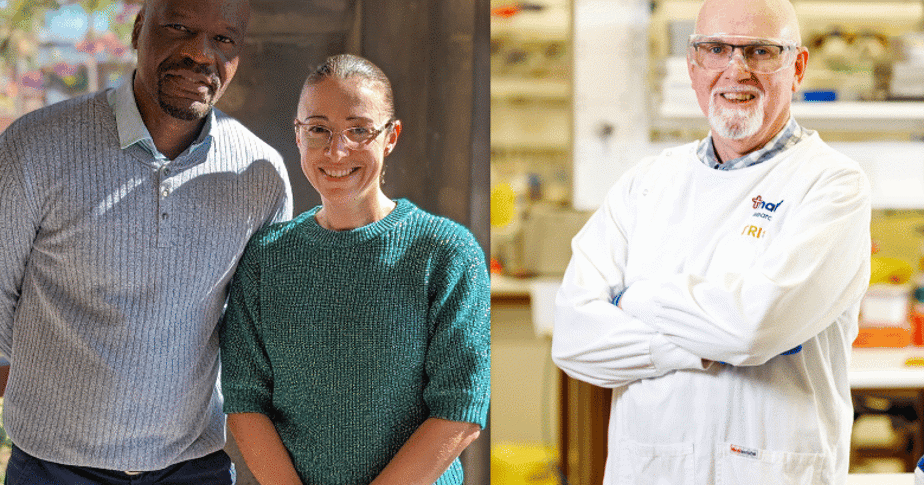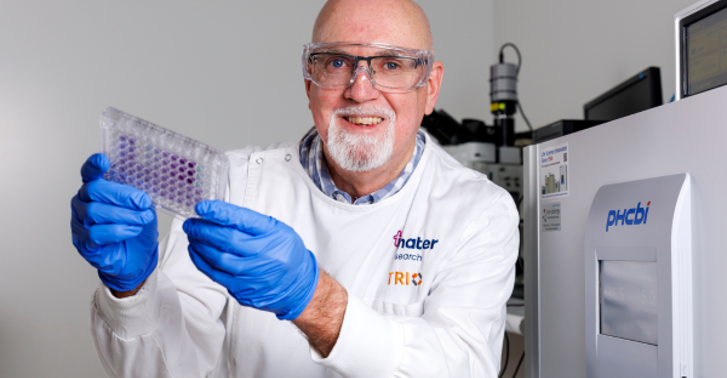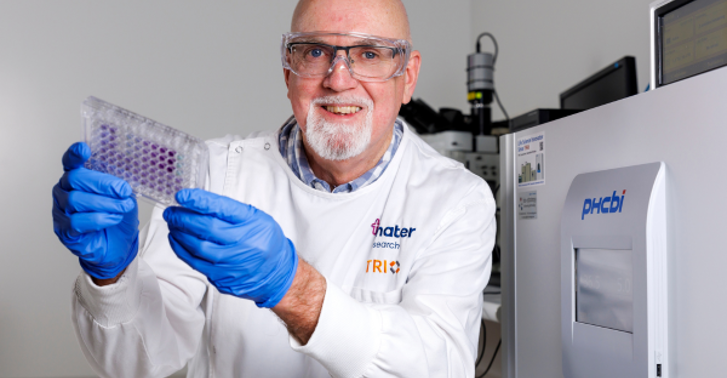
During Men’s Health Week 2023, Mater Research is shining a ‘fluorescent’ light on the work being done by researchers to improve the surgical and medical treatment options for men with prostate cancer.
One in six Australian men will be diagnosed with prostate cancer by the time they are 85, and Professor John Hooper who leads the Cancer Biology Research Group at Mater Research is working on a project with his team that will help surgeons identify tumour deposits.
Professor Hooper explains that for some cancers, surgeons can inject patients with a fluorescent dye (called Indocyanine Green, or ICG) to help them identify tumour deposits.
“The dye accumulates in tumours, and approximately an hour after being administered, the surgeon is able to see the tumour by shining a fluorescent light over the area of the patient’s body where they’re operating, enabling them to identify and remove otherwise difficult to see tumour deposits.
“This dye does not currently work for prostate cancer, however my team and I are working to adapt and improve the ICG dye so it can.
“This will help surgeons distinguish regions of cancer from blood vessels and other structures in close proximity,” Professor Hooper said.
The team’s approach is to attach ICG to a small molecule called a peptide that has the ability to bind strongly to the specific proteins on the patient’s cancer cells.
“When the modified fluorescent dye is injected into the patient’s bloodstream prior to surgery, it circulates until it binds to the protein on the cancer cell where it effectively lights up the tumours to make them easier to see and be removed by the surgeon.
“The specific protein being targeted by the improved ICG dye is present at high levels in approximately 50% of patients who have the most aggressive type of prostate cancer, meaning the new ICG-peptide has potential to benefit to a large number of men who have prostate cancer,” Professor Hooper said.
Professor Hooper is also currently working on a study with Mater clinicians, led by medical oncologist Dr Niara Oliveira and pathologist Dr Admire Matsika, which is looking at treatment options for men with advanced prostate cancer.
Dr Oliveira said that there is a shift towards treatment intensification strategies for these men, which involve the combination of two or even three drugs.
“It is, however, a challenge to distinguish which patients will benefit most from intensifying their treatment,” Dr Oliveira said.
For the study, Dr Oliveira and Dr Matsika are examining tumour specimens from more than 145 prostate cancer patients, studying how biomarker levels correlate with patient outcomes including survival, time to disease recurrence, and a variety of clinical parameters, including such as Prostate-Specific Antigen (PSA) level.
Dr Matsika said that in parallel with this clinical component, they are working with Professor Hooper to understand if a new drug, called an antibody-drug conjugate, could benefit men who don’t currently benefit from treatment intensification strategies.
“This component of the work involves the use of disease-relevant models to test a new antibody-drug conjugate, developed by Prof Hooper’s research team, that specifically targets a protein that is enriched on the surface of the malignant cells of advanced prostate cancers,” Dr Matsika said.
Professor Hooper said that this study could lead to improved personalisation of the care of men who have advanced prostate cancer with the goal to increase patient survival and quality of life.
“By working with Mater’s clinical multidisciplinary teams, including surgeons, medical oncologists, pathologists, palliative care physicians, nurses and researchers, we can collaborate to develop novel therapies that result in cancer cell death, tumour regression and improved patient survival and quality of life,” Professor Hooper said.
To learn more about Professor John Hooper, or to get in touch, click here.
To learn more about the Cancer Biology Research group at Mater Research, click here.



